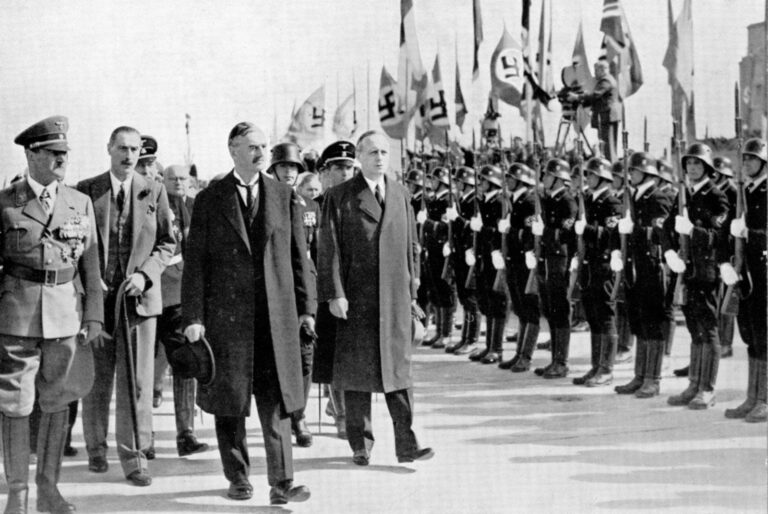As Washington gears up for high-stakes diplomatic negotiations in 2025, echoes of history are casting long shadows over the proceedings. The 1938 Munich Agreement – widely criticized for its appeasement of Nazi Germany – continues to serve as a cautionary tale and a point of contention in contemporary transatlantic relations. Political analysts and diplomats alike warn that the legacy of Munich’s concessions still influences decision-making frameworks in the U.S. capital, shaping strategies and fueling debates about the risks of compromise in the face of authoritarian aggression. This article explores how the specter of Munich 1938 haunts today’s talks in Washington, underscoring the enduring impact of past failures on present-day diplomacy.
Munich 1938 Legacy Shapes Diplomatic Calculus in Washington 2025 Talks
Decades after the infamous Munich Agreement ceded Sudetenland to Nazi Germany in an attempt to stave off war, its shadow still looms over contemporary diplomatic negotiations in Washington. The 2025 talks, focusing on managing rising global tensions and recalibrating alliances, reflect a cautious approach deeply informed by the failures of appeasement. Policymakers remain wary of conceding strategic ground under pressure, mindful that what was once seen as a peace-making gesture in 1938 became a catalyst for broader conflict. This historical baggage compels American diplomats to balance firmness with strategic flexibility, ensuring that compromises do not inadvertently embolden adversarial actors.
Inside the negotiation rooms, several recurring themes shaped by Munich’s legacy have emerged:
- Reluctance to Sacrifice Allies: Strong support for partners deemed vulnerable, avoiding isolation through unilateral concessions.
- Heightened Vigilance: No tolerance for aggressive surprise moves that could alter the strategic balance overnight.
- Emphasis on Deterrence: Reinforced military commitments to deter attempts at exploiting perceived Western hesitation.
| Aspect | 1938 Approach | 2025 Approach |
|---|---|---|
| Response to Aggression | Appeasement and concessions | Firm deterrence and coalition building |
| Alliance Strategy | Isolation of some allies | Defensive solidarity |
| Long-Term Outcome | Temporary peace, eventual war | Prevent escalation, maintain stability |
Historical Lessons Inform Contemporary Strategy on Authoritarian Demands
The echoes of Munich 1938 remain a potent warning in today’s diplomatic arenas. The notorious appeasement of Adolf Hitler, driven by a desire to avoid conflict, ultimately emboldened authoritarian ambitions and accelerated global catastrophe. This historical episode underscores the perils of yielding to aggressive demands without scrutinizing the long-term consequences. Modern policymakers, especially those navigating the fraught landscape of Washington’s 2025 negotiations, are keenly aware that concessions perceived as signs of weakness can invite further coercion rather than ensure peace.
Drawing lessons from history, current strategists emphasize a multi-layered approach that balances firmness with engagement. This includes:
- Robust verification mechanisms to ensure compliance with agreements
- Clear red lines that dissuade future provocations
- Alliance cohesion to present a unified front
- Incremental diplomacy rather than sweeping concessions
These strategies reflect an understanding that the pitfalls of Munich were not only in the act of concession but in the absence of strategic foresight and enforceable commitments, a caution that shadows the corridors of power today.
| Lesson from 1938 | Modern Application |
|---|---|
| Appeasement invites aggression | Firm red lines against authoritarian overreach |
| Lack of enforceable terms | Integration of verification and accountability |
| Fragmented alliances | Coordinated international coalition |
| Underestimation of threats | Realistic threat assessment and preparedness |
Bridging Past and Present Diplomatic Failures to Forge Resilient Policy Frameworks
History insists on repeating itself when lessons remain unlearned. The concessions made at Munich in 1938, intended to stave off conflict, instead emboldened an aggressive regime, setting Europe on a path to devastation. Fast forward to Washington in 2025, the echoes of these diplomatic missteps resonate amid high-stakes negotiations where caution risks being mistaken for weakness. The reluctance to confront hard truths and enforce firm boundaries with adversarial powers draws an uncomfortable parallel to those who once sought peace at any price. As policymakers grapple with complex security dilemmas, the challenge is not only to avoid appeasement but to build durable frameworks that prioritize deterrence without recklessness.
Analysts argue that resilience in diplomacy stems from acknowledging past failures and incorporating strategic foresight. In an era of rapid geopolitical shifts,Â
key pillars for robust policy include:
- Clear red lines paired with credible consequences
- Multilateral engagement balanced with decisive national action
- Adaptive intelligence-gathering mechanisms to anticipate threats
- Sustained diplomatic investment beyond short-term gains
To illustrate, the comparative table below outlines critical elements where Munich’s appeasement diverges sharply from contemporary diplomatic necessities:
| Diplomatic Element | Munich 1938 | Washington 2025 |
|---|---|---|
| Approach to Aggression | Concession without enforcement | Firm deterrence with coalition support |
| Stakeholder Engagement | Limited regional actors | Broad multilateral alliances |
| Long-Term Vision | Short-term peace illusion | Strategic resilience and adaptability |
| Accountability Mechanisms | Absent or ineffective | Enforceable agreements with monitoring |
To Conclude
As Washington navigates the delicate negotiations of 2025, the shadow of Munich 1938 remains unmistakable. The concessions made to Nazi Germany then serve as a cautionary tale, reminding policymakers that appeasement can carry profound and lasting consequences. For today’s diplomats, history is more than a lesson-it is a mandate to approach talks with vigilance, resolve, and an acute awareness of past failures. How the current administration balances these pressures will not only shape the outcome of the talks but also define America’s stance on international diplomacy for years to come.




